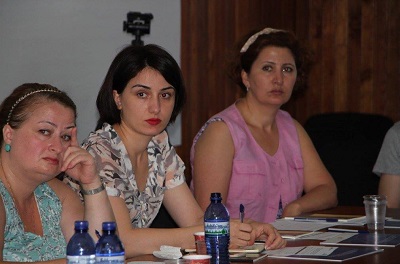Engaging more IDP women in dialogue with the central government
Date:
Following the recent Gali Incident Prevention and Response Mechanism (IPRM) meeting on 26 July 2017, a regular information-sharing meeting was held in Zugdidi (Samegrelo region) between internally displaced and conflict-affected women and government representatives engaged in IPRM.

Women residing in the villages across the ABL listening to the updates from the last IPRM meeting; Photo: UN Women
Ms. Tamta Goguadze, representing the State Security Service, updated the attendees on the developments related to the documentation processing for crossing the ABL and measures taken on the national and international levels to ensure the safety and security of the population living across the ABL. Ms. Goguadze emphasized the importance of receiving the first-hand information from women who are crossing the ABL and the obstacles faced in order to take effective measures and ensure that their human rights and right to freedom of movement are not violated.
Along with security matters, government representatives addressed the health and socioeconomic issues raised by the women from the ABL villages. According to Mr. Zviad Zviadadze, representative of the Office of the State Minister for Reconciliation and Civic Equality (OSMRCE), in 2018 a new hospital will open in Rukhi with the capacity to offer quality health services to the population of neighbouring villages. Ms. Lali Devidze, adviser at the OSMRCE, highlighted projects aimed at addressing the needs of IDP and conflict-affected women within the framework of the Interim Governmental Commission on the needs of persons living across the ABL.
Ms. Ia Nalchevanidze voiced the problems that women residing in the village of Khurcha face daily, including lack of access to health care and socio-psychological services, as well as problems related to income gained from agricultural production. She commented: “Sharing the concerns of my community to the central government representatives and receiving information on ongoing and planned activities makes me hopeful. I will bring the sparks of hope back to the women in my village.”
Meetings between civil society and grass-roots community representatives and IPRM participants was launched by UN Women in 2013. It has become a regular dialogue mechanism and is chaired by the OSMRCE as part of its commitment under the National Action Plan of Georgia for the implementation of the UN Security Council resolutions on Women, Peace and Security.